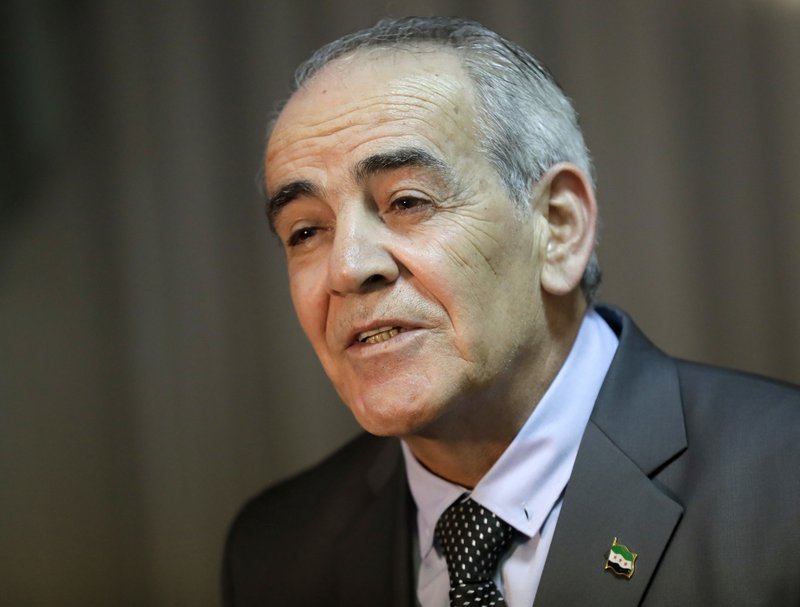ASTANA, Kazakhstan -- Delegates from Russia, Turkey and Iran held hourslong talks in Kazakhstan on Sunday on the eve of negotiations between Syrian rebels and President Bashar Assad's government.
The talks between the two warring sides will be the first in a year, and they are meant as a first step to consolidate a cease-fire reached last month in the country's civil war.
Whether Russia and Turkey will manage to bolster the cease-fire they brokered Dec. 30 will be a key measure of success for the Astana meetings, Syrian opposition spokesman Yahya al-Aridi told reporters in the Kazakh capital Sunday.
The opposition delegation, which arrived in Astana earlier in the day, is made up of about a dozen rebel figures led by Mohammed Alloush of the Army of Islam rebel group. The Syrian government is sending its U.N. ambassador, Bashar Ja'afari, and military delegates.
The U.N.'s Syria envoy, Staffan de Mistura, is participating in the talks, which are to be followed by more political talks in February in Geneva.
The new U.S. administration is not directly involved because of the "immediate demands of the transition," the State Department said Saturday, but Washington will be represented by the U.S. ambassador to Kazakhstan, George Krol. Faysal Itani, an analyst with the Atlantic Council in Washington, said the U.S. is now "marginal to the war" in Syria, and its relative exclusion from the initiative will "not prevent the Turks and the Russians coming to and implementing an agreement."
The talks are the latest attempt to forge a settlement to end a war that has by most estimates killed more than 400,000 people since March 2011 and displaced more than half the country's population.
At the top of the agenda for the talks, which will be held at the Rixos President Hotel, is an effort to consolidate last month's cease-fire, which includes the Syrian government and seven Islamist groups representing 62,000 fighters. The truce excludes extremist groups such as the Islamic State and Jabhat Fatah al-Sham, formerly known as the Nusra Front. The truce has reduced overall violence, but fighting and violations continue on multiple fronts.
"If this can be achieved, this can help the political process," said al-Aridi.
The scope of the talks reflects the constrained position of the opposition, which last year was pushing for a political transition in Syria that would exclude Assad.
Al-Aridi said there was no plan to discuss Assad's position before addressing what he said were ongoing government violations of the cease-fire.
"If the other side doesn't care about stopping the bloodshed in Syria, and cares most about staying in power at the expense of Syrian blood ... in that case, nothing will work," al-Aridi told reporters in Astana. Reflecting the distrust at play, he described the Iranians as "spoilers" and "occupiers" and claimed they are not serious about the entire process.
Iran and Russia have provided key financial and military support to Assad's government, while Turkey, Saudi Arabia and Qatar have backed the opposition.
"The center of gravity in the Syrian conflict is moving away from great powers to regional players," said Andrey Kortunov, director general of the Russian International Affairs Council, a research group set up by the Kremlin. "A lot will depend on whether there is a chance to bring all these players together and whether a country like Russia might play an instrumental role in that."
Ja'afari told reporters on the plane to Astana that in addition to cease-fire talks, a priority was to "unify efforts to combat terrorism." He said the meeting will "test the credibility and seriousness of participants sitting around the table and those who support them."
Russian President Vladimir Putin's special adviser on Syria, Alexander Lavrentiev, said after more than four hours of meetings with the Turkish and Iranian delegations that the three countries were "moving toward a united front."
It was not clear whether the warring sides will hold face-to-face meetings. If they do, it will be the first time in three years.
The opposition has promised to highlight the government's harsh siege tactics, which have cut off hundreds of thousands of Syrians from food and medical access. In areas such as the Damascus suburbs and parts of the central city of Homs and its environs, civilians have been under siege by government forces since at least 2015.
Turkey could play a crucial role in the latest attempt to resolve a conflict that has confounded diplomats for years. Turkish President Recep Tayyip Erdogan is embroiled in troubles at home and has moved closer to Russia recently, prioritizing the fight against Kurds and the Islamic State over support for the Syrian rebels he has propped up for years.
Assad's forces recaptured the northern city of Aleppo last month with considerable Russian aid, dealing a blow to the opposition, which had held onto eastern parts of the city for four years.
This week's talks will be closely followed in Syria and by the millions of Syrian refugees scattered across the globe.
"If Turkey is now feeling the guilt over what it committed toward the Syrian people, we hope that it will give at this conference something positive, to speed up an end to the crisis," said Anas Farfouti, a resident of Aleppo who supports Assad.
The talks, which are expected to last several days, aim in part to pave the way for political dialogue among the region's powers, Russian Foreign Ministry spokesman Maria Zakharova said Thursday.
"That would be a big achievement if it happened," said Bassma Kodmani, a leader of the main Syrian opposition bloc. "Turkey and Russia are two decisive players on the ground, but there is one player -- Iran -- with which it's much more difficult to know if there is any interest in a cessation of hostilities and a political process."
Information for this article was contributed by Philip Issa, Zeina Karam, Bassem Mroue and Albert Aji of The Associated Press; and by Henry Meyer of Bloomberg News.
A Section on 01/23/2017

